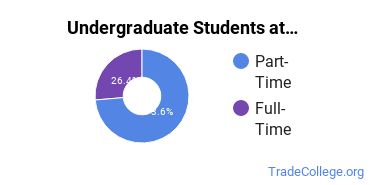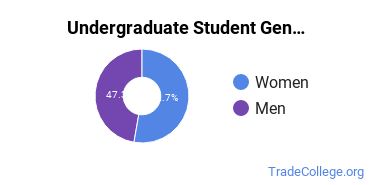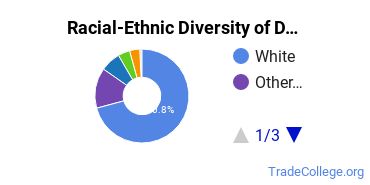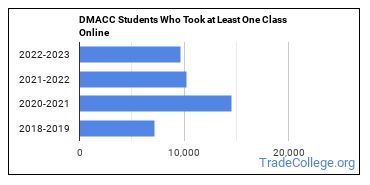Find Trade Colleges
Des Moines Area Community College Trade Programs
Located in Ankeny, Iowa, Des Moines Area Community College is a public institution. Ankeny is considered a suburb and offers tranquility and safety near the excitement of a city center.
Where Is Des Moines Area Community College?

Contact details for DMACC are given below.
| Contact Details | |
|---|---|
| Address: | 2006 Ankeny Blvd, Ankeny, IA 50023-3993 |
| Phone: | 515-964-6200 |
| Website: | www.dmacc.edu |
Can I Afford DMACC?
| In State | Out of State | |
|---|---|---|
| Tuition | $5,550 | $11,100 |
| Books and Supplies | $810 | $810 |
| On Campus Room and Board | $8,190 | $8,190 |
| On Campus Other Expenses | $2,358 | $2,358 |
Student Loan Debt
Almost 66% of college students who graduated with the class of 2018 took out student loans, but that percentage varies from school to school. At DMACC, approximately 29% of students took out student loans averaging $4,839 a year. That adds up to $19,356 over four years for those students.
Explore Best Ranked Schools for You
Des Moines Area Community College Undergraduate Student Diversity

Gender Diversity
Of the 5,703 full-time undergraduates at DMACC, 45% are male and 55% are female.

Racial-Ethnic Diversity
The racial-ethnic breakdown of Des Moines Area Community College students is as follows.

| Race/Ethnicity | Number of Grads |
|---|---|
| Asian | 186 |
| Black or African American | 272 |
| Hispanic or Latino | 410 |
| White | 4,049 |
| International Students | 62 |
| Other Races/Ethnicities | 724 |
Over 53 countries are represented at DMACC. The most popular countries sending students to the school are China, Vietnam, and South Korea.
Online Learning at Des Moines Area Community College
The following chart shows how the online learning population at DMACC has changed over the last few years.

The following table shows the 1-year growth rate of DMACC majors that offer at least one online course. This table only includes majors with positive growth.
| Major | 1-Year Growth Rate |
|---|---|
| Medical Administrative/Executive Assistant & Medical Secretary | 10% |
Des Moines Area Community College Trade School Concentrations
The table below shows the number of awards for each concentration.
Des Moines Area Community College Trades
In a recent academic period, Des Moines Area Community College awarded 3,830 undergraduate degrees. The table below shows the number of awards by award type for each trade program. Basic certificates are awards that are completed in less than a year, and undergraduate certificates are those awards that take between one and four years.
| Major | Basic Certificates | Undergrad Certificates | Associate’s | Bachelor’s |
|---|---|---|---|---|
| Allied Health & Medical Assisting Services | 0 | 13 | 0 | 0 |
| Allied Health Professions | 104 | 9 | 20 | 0 |
| Carpentry | 0 | 7 | 2 | 0 |
| Civil Engineering Technology | 0 | 0 | 2 | 0 |
| Clinical/Medical Laboratory Science | 21 | 0 | 20 | 0 |
| Culinary Arts | 0 | 20 | 25 | 0 |
| Dental Support Services | 0 | 27 | 22 | 0 |
| Drafting & Design Engineering Technology | 0 | 24 | 22 | 0 |
| Electrical & Power Transmission Installers | 0 | 11 | 0 | 0 |
| Electromechanical Engineering Technology | 0 | 0 | 11 | 0 |
| Electronics Engineering Technology | 1 | 11 | 14 | 0 |
| Electronics Maintenance & Repair | 0 | 0 | 4 | 0 |
| Energy Systems Technologies | 0 | 0 | 8 | 0 |
| Environmental Control Technology | 35 | 10 | 14 | 0 |
| Funeral & Mortuary Science | 0 | 49 | 16 | 0 |
| Health & Medical Administrative Services | 26 | 7 | 14 | 0 |
| Heating, Air Conditioning, Ventilation & Refrigeration | 1 | 8 | 9 | 0 |
| Practical Nursing & Nursing Assistants | 517 | 17 | 0 | 0 |
| Precision Metal Working | 206 | 73 | 17 | 0 |
| Vehicle Maintenance & Repair | 35 | 27 | 70 | 0 |
| Total | 2,170 | 866 | 794 | 0 |
References
*The racial-ethnic minorities count is calculated by taking the total number of students and subtracting white students, international students, and students whose race/ethnicity was unknown. This number is then divided by the total number of students at the school to obtain the racial-ethnic minorities percentage.
More about our data sources and methodologies.
